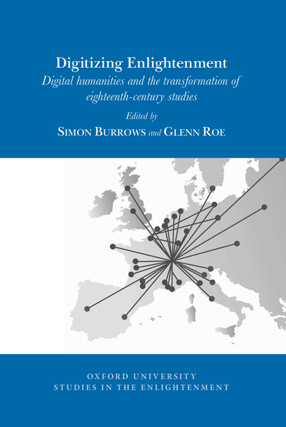Published this month, Digitizing Enlightenment: Digital Humanities and the Transformation of Eighteenth-Century Studies is the latest volume in the renowned series Oxford University Studies in the Enlightenment.[1. Digitizing Enlightenment: Digital Humanities and the Transformation of Eighteenth-Century Studies, ed. Simon Burrows and Glenn Roe (Liverpool University Press, 2020), with contributors Keith Michael Baker, Elizabeth Andrews Bond, Robert M. Bond, Simon Burrows, Catherine Nicole Coleman, Melanie Conroy, Charles Cooney, Nicholas Cronk, Dan Edelstein, Chloe Summers Edmondson, Richard Frautschci, Clovis Gladstone, Howard Hotson, Katherine McDonough, Angus Martin, Alicia C. Montoya, Robert Morrissey, Jeffrey S. Ravel, Glenn Roe, and Sean Takats.] Under the joint editorship of Professor Simon Burrows (Western Sydney University) and Professor Glenn Roe (Faculté des Lettres, Sorbonne Université), this publication offers insightful accounts of the origins of an array of Digital Humanities projects and situates each in the context of Enlightenment research conducted over the past decade, together with consideration of the myriad of ways in which digital approaches may be incorporated more broadly into humanities scholarship.
The volume stems from an inter-disciplinary initiative, also called ‘Digitizing Enlightenment’, that draws together leading international Enlightenment scholars on an annual basis to discuss projects, collaborations, and the use of digital methods. The first section of the book—’Digital projects, past and present’—contains accounts by members of this community of the unique histories and evolution of the projects they oversee, consideration of points of overlap, and discussion of the variety of the digital methods employed, while the second section—’Digital methods and innovations’—showcases the research of early career scholars who have forged academic paths in the wake of these pioneering initiatives and who are situated at this point in their careers at the fortuitous juncture between digital methods and traditional Enlightenment studies.
The projects discussed in depth include: The ARTFL Encyclopédie Project (University of Chicago); The Comédie-Française Registers Project (Bibliothèque-Musée de la Comédie-Française, Université Paris Nanterre, Université Paris-Sorbonne, Massachusetts Institute of Technology, Harvard University, and University of Victoria); our own Cultures of Knowledge project (University of Oxford); Electronic Enlightenment (University of Oxford); The French Book Trade in Enlightenment Europe (Western Sydney University); Mapping the Republic of Letters (Stanford University); and MEDIATE: Measuring Enlightenment Disseminating Ideas, Authors and Texts in Europe (1665–1830) (Radboud Universiteit). Readers eager for correspondence-related material will find of particular interest the contributions by Catherine Nicole Coleman, Melanie Conroy and Chloe Summers Edmondson, Nicholas Cronk, Dan Edelstein, and Howard Hotson. With our ways and means of working in the virtual and with the digital evolving (often at remarkable speed in these virus-altered days), this volume is timely, setting out advice and experience from the past decade of Digital Humanities scholarship. As with the recent Göttingen University Press publication Reassembling the Republic of Letters in the Digital Age: Standards, Systems, Scholarship, this volume offers a glimpse into what might be possible as we stride forward into collaborative, linked environments.[2. Reassembling the Republic of Letters in the Digital Age: Standards, Systems, Scholarship ed. Howard Hotson and Thomas Wallnig (Göttingen University Press, 2019). PDF version available online.]
Further details of the publication (together with the Preface, Table of Contents, and Introduction, alongside Visualizations, Maps, Figures, and Tables used in the volume) and an informative post by Simon Burrows and Genn Roe may be consulted online at Liverpool University Press.

